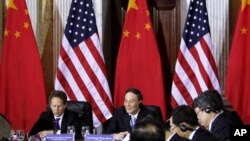"China and the United States face a wide range of common regional and global challenges," U.S. Secretary of State Hillary Rodham Clinton said at the opening of the third round of the U.S.- China Strategic and Economic Dialogue in Washington DC. "How our two countries work together to meet those challenges will help define the trajectory, not only of our relationship going forward, but the future peace, prosperity, and progress of the world."
Whether it’s the global financial crisis, or the upheaval in the Middle East, recent events have underscored the intersection between the U.S. and China's economies, and global security and stability. "[T]hat intersection is at the heart of our dialogue," Secretary Clinton said. "[W]e will be discussing the need to work together to rebalance the global economy and assure strong, sustained future growth."
Still, fears and misperceptions linger. Some in the United States see China’s progress as a threat to the United States. Some in China worry that America seeks to constrain China’s growth. "We reject both those views," Secretary Clinton said. "We both have much more to gain from cooperation than from conflict."
The Strategic and Economic Dialogue between China and the United States begins with a mutual commitment to better understand one another. This is why both Secretary Clinton and the Secretary of Defense Robert Gates have emphasized the importance of military-to-military engagement. "I am very pleased that for the first time, senior military officials from both sides will participate in this Dialogue," Secretary Clinton said. "They will join civilian counterparts to discuss how we can reduce the dangerous risks of misunderstanding and miscalculation."
The United States is working to build greater understanding and trust between the citizens of China and America, and to foster stronger ties between students, businesses, and communities of both countries.
"[L]ike any two great nations – in fact, I would argue like any two people – we have our differences. And like friends, we discuss those differences honestly and forthrightly," Secretary Clinton said. "We have made very clear, publicly and privately, our concern about human rights."
"The fact is that a thriving America is good for China and a thriving China is good for America," U.S. Secretary of State Hillary Clinton concluded. "[T]o work together, we need to be able to understand each other’s intentions and interests. And we must demystify long-term plans and aspirations."
U.S.-China Strategy and Economic Dialogue

"China and the United States face a wide range of common regional and global challenges."



